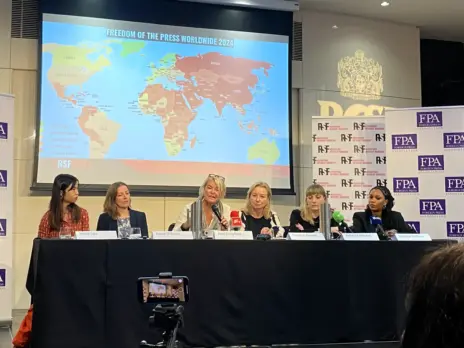
Alternative press regulator Impress could split in two within three years as it looks to expand its extra-regulatory services, including setting up a “pro-bono legal group” that will offer advice to its members.
Impress now claims more than 100 publications as members (although it counts some print and digital operations separately) most of which are smaller, independent outlets.
The majority of national newspapers and magazines are regulated by the Independent Press Standards Organisation.
Impress chief executive Jonathan Heawood told Press Gazette that since it was set up in 2013 the regulator has “had to reset its expectations several times over the years”.
“Back when I first had the idea five years ago now, it looked like some of the big publications – the Guardian, the Financial Times and the Independent – might consider joining an alternative regulator,” he said.
“It turned out that they didn’t, but we discovered this huge untapped market of the independent sector, so we went on a bit of a journey there trying to work out what that meant for us.”
He said Impress’ members are often new start-up sites that do not have “big in-house legal capacity, managing editors and years of experience” and look to the regulator for support with ethical and legal challenges – “they don’t just see us as the place where problems go”.
He said Impress was “putting together what will be a kind of pro-bono legal group” outside of its current services that will work with “experienced media lawyers” to offer up to a certain number of hours of advice every year to members facing particular legal problems.
“We’re now planning the next three years of our development, so it’s something we want to happen within the next three years,” he said.
“I guess the journey we’re on is working out what more we can do on top of that old school, reactive complaints handling – but obviously we’ve got to do it in a way that doesn’t compromise our ability to be an impartial regulator.
“So another thing that might happen down the line, and this is something we’re just talking about internally, is we might develop our corporate structure to separate out those two functions, so the regulatory function sits in one entity and this more proactive research, development, networking, engagement function sits in a sort of sister entity.”
Impress regulates investigative outlet Bellingcat – which recently made headlines when it exposed the true identity of the Russian spies behind the fatal Novichok poisoning in Salisbury this summer – and The Ferret.
Its more well-known members are among the most prominent of the so-called “alt-left” websites: The Canary, Evolve Politics and Skwakbox, which typically promote an anti-mainstream media, or “MSM”, narratives, and broadly support Jeremy Corbyn’s leadership of the Labour Party.
Heawood admits Impress’ members include “some of these more challenging [outlets” that are “setting out in some ways to be the new tabloids”, but says its membership makes up a cross-section of the independent new sector unlike anywhere else.
Heawood said he was “conscious they are in the mix”, but added: “We think there’s no reason why those sites can’t still produce high-quality journalism, just as there could be on the right, strong partisan views, as long as they can distinguish between fact and opinion.
“As long as their facts are properly checked, as long as they’re not inciting hatred against vulnerable groups, as long as they can meet those basic professional standards we’re here for them.
“We’re also here for right-wing sites or non-political sites just as much.”
Heawood, a former deputy literary editor at the Observer, added: “You could say that IPSO has cornered the market in right-wing news publications… All I can say is we are value neutral.
“I don’t want to give the wrong impression… but a reasonable proportion of our regulatory activity has been driven by those sites and I hope they have a straight dealing from us.
“I suspect they are on a bit of a learning curve. They obviously want to be the left-wing alternative, they also, I believe, want to be taken seriously as publishers of journalism. We’re all on a bit of a journey to show this is what 21st Century political journalism looks like.”
Where Impress has frequently drawn criticism is in its funding model, which remains entirely dependent on money from prominent press reform campaigner Max Mosley.
Earlier this year Mosley attempted to gag newspapers from repeating claims he took part in a kinky sex orgy years ago and his funding links to Impress by using data protection laws.
He claimed in a comment pieced published by Press Gazette that the references were “an attempt to smear me and Impress by association”.
Mosley is a trustee of the Alexander Mosley Charitable Trust, named after his eldest son who died of a suspected heroin overdose in 2009. The trust agreed to pay out £3.8m in 2015 to the Independent Press Regulation Trust over four years. The IPRT directly funds Impress.
Heawood said Mosley is happy to continue funding Impress for several more years – “and obviously we wouldn’t be here without it”. He said the former motorsport boss had been “remarkably hands off” and claimed there is “no particular benefit” to his family from its support for the regulator.
Mosley, son of British fascist leader Oswald Mosley, came under the spotlight earlier this year after the Daily Mail revealed a political pamphlet from 1961 which bears Mosley’s name on it as publisher.
It warned British voters that “coloured immigration threatens your children’s health”. Mosley told Channel 4 News in an interview that he wasn’t sure it the leaflet was genuine and it did not reflect his views.
He was also forced to deny having perjured himself at the High Court in 2008 during a privacy case against the News of the World over its story exposing his involvement in an orgy with paid dominatrices.
Mosley denied in court that the leaflet existed and called on prosecutors to produce it, which they could not do at the time. He went on to win £60,000 in privacy damages.
Despite the allegations against Mosley, Heawood said Impress had “no plans to cut ties” with him, but was speaking with other potential funders “because we want to be around for as long as we want to be around”.
Asked by Press Gazette if there was a point at which the regulator would stop taking Mosley’s money, Heawood acknowledged that his association with the regulator had been a “very easy stick for people to beat us with”.
“We have been very exposed in relation to our funding and for people who have got deep-seated interest in standing in the way of what Impress is trying to do, that’s obviously the thing that they’re going to focus on, rather than actually engaging with the more substantive work that we do, or our code or our membership, or our many strengths,” he said.
Given Impress’s absolute reliance on funding from Mosley, Press Gazette suggests Impress is “trapped in the relationship” with the millionaire.
Heawood admitted it was a “funny situation” and that Impress “couldn’t have got off the ground without that support”, but he said the regulator was “not being used to do anything other than what we do, which is to try to support high-quality journalism”.
Impress was in favour of Section 40, the amendment to the Crime and Courts Act that threatened to make publications pay for court battles, win or lose, although Heawood said it was clear it “isn’t happening”.
Section 40 would protect publications from paying legal costs if they were members of a Royal Charter-recognised press regulator (of which Impress is the only example).
He said Section 40 “seemed to do two quite useful things. One was to incentivise independent regulation, which we obviously think is a good thing otherwise we wouldn’t be doing what we’re doing.
“And the second thing was to provide access to justice for people who have got themselves into a dispute with a big newspaper.”
Heawood said those needs still remain, adding: “If you’ve got a market at the moment which is in some ways creating downward pressure on standards because of the need to maximise clicks and digital advertising revenue then something like Section 40 starts to look really sensible.
“Something that you could use to incentivise high-quality journalism seems like the missing link in the chain.
“Government can’t just throw money at the press, they can’t just say: ‘Here’s however many hundred million or billion pounds, share it out among yourselves’. What does that do?
“Nor can or should Facebook or Google get the right to decide who gets a subsidy or who gets preferential treatment in the algorithm.
“If you’re going to have some mechanism to support ‘high-quality journalism’ then it seems to us that membership of an independent regulator is quite a good indicator that a news publisher is committed to high-quality journalism.”
Impress was alone against the vast majority of newspapers in supporting Section 40. Local newspaper publishers, in particular, warned it could financially ruin them to pay both sides’ legal fees, while others said it would result in the rich being able to file a legal claim even if not credible.
Heawood said criticism of Impress from the national press was the result of “having an industry that’s very accustomed to doing things a certain way and we came along saying let’s do things a slightly different way”.
“I think that’s really what’s been happening and noise about Section 40 and Max Mosley and so on I really genuinely feel that’s just been like the froth on the cappucino.
“I don’t think we could have said or done things differently in the last few years that would have changed any of that, so what seemed important to us was to be true to our values and stand up for what we believed in.
“And I think we feel that actually in some ways the debate has moved on.”
A judicial review into the Press Recognition Panel’s decision in 2016 to recognise Impress under the Royal Charter – a device recommended by the Leveson Inquiry report into the press – is still ongoing.
The PRP won a High Court battle with the News Media Association in October last year, but an appeal is set to be heard next year.
“There could be another flurry of activity around that,” said Heawood. “It’s something we’ve gotten very used to over the last few years but it is great that otherwise there seems to be a more constructive tone to a lot of the debate at the moment.”
Impress will hold its inaugural Trust In Journalism conference on Tuesday next week in Farringdon, central London.
Speakers at the all-day event are set to include former Guardian editor Alan Rusbridger, Bureau of Investigative Journalism managing editor Rachel Oldroyd and Open Democracy editor-in-chief Mary Fitzgerald.
Picture: Impress
Email pged@pressgazette.co.uk to point out mistakes, provide story tips or send in a letter for publication on our "Letters Page" blog






